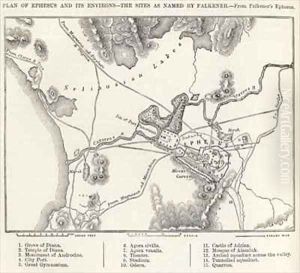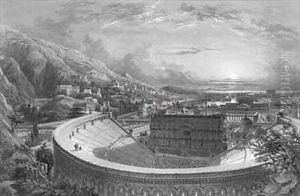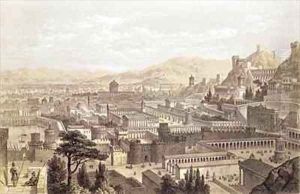Edward Falkener Paintings
Edward Falkener was a British architect, author, and amateur archaeologist, born in 1814. His contributions, particularly in the field of archaeology, were notable during the Victorian era, a period marked by a great interest in ancient history and culture among the British elite. Falkener received his education and training in architecture, which later influenced his archaeological pursuits.
Throughout his career, Falkener was known for his fascination with ancient civilizations, particularly those of Greece and Rome. He was a member of various learned societies and contributed to the discussions on architectural history and archaeology. His knowledge of classical architecture is often showcased in his written works and architectural designs.
One of his most significant works is 'Ephesus, and the Temple of Diana' (1862), where he provided a detailed account of the ancient city of Ephesus and the famous Temple of Artemis, one of the Seven Wonders of the Ancient World. Falkener's interest in the temple was not only historical but also architectural, as he attempted to reconstruct the temple's design and dimensions based on historical descriptions and archaeological evidence.
In addition to his scholarly work, Edward Falkener also practiced as an architect, though his built works are less well-known compared to his archaeological and literary contributions. His architectural endeavors were influenced by his classical education and often incorporated elements inspired by ancient Greek and Roman designs.
Falkener's contributions to the field of archaeology and his efforts to promote understanding of ancient civilizations were recognized by his contemporaries. His works provided valuable insights into the ancient world and influenced both scholarly research and public interest in classical antiquity during the 19th century.
Edward Falkener passed away in 1896, leaving behind a legacy as a dedicated scholar of the ancient world. His works continue to be of interest to historians, archaeologists, and architects interested in the classical tradition and its impact on the modern world.


